Violeta Luna | |
|---|---|
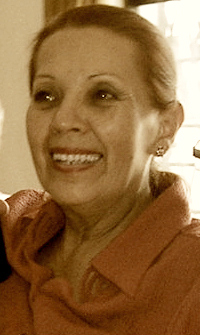 | |
| Born | 24 February 1943 Guayaquil, Ecuador |
| Occupation(s) | Poet, novelist and professor |
Violeta Luna (born 24 February 1943 in Guayaquil) is an Ecuadorian poet, essayist, professor and literary critic. [1]
Violeta Luna | |
|---|---|
 | |
| Born | 24 February 1943 Guayaquil, Ecuador |
| Occupation(s) | Poet, novelist and professor |
Violeta Luna (born 24 February 1943 in Guayaquil) is an Ecuadorian poet, essayist, professor and literary critic. [1]
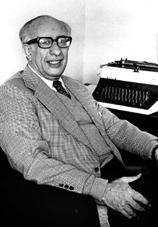
Alejandro Carrión Aguirre was an Ecuadorian poet, novelist and journalist. He wrote the novel La espina (1959), the short story book La manzana dañada (1983), and numerous poetry books. As a journalist he published many of his articles under the pseudonym "Juan Sin Cielo." In 1956 he founded, along with Pedro Jorge Vera, the political magazine La Calle. He directed the literary magazine Letras del Ecuador. He received the Maria Moors Cabot prize (1961) from the Columbia University Graduate School of Journalism as well as the Ecuadorian National Prize Premio Eugenio Espejo (1981) for his body of work. He was the nephew of Benjamín Carrión and Clodoveo Carrión.

Adalberto Ortiz - born Adalberto Ortiz Quiñones was a novelist, poet and diplomat born in Esmeraldas, a province of Ecuador.
Iván Carvajal Aguirre is an Ecuadorian poet, philosopher and writer. In 1984 he received Ecuador's National Prize for Literature, the "Aurelio Espinosa Pólit" prize, for his work entitled "Parajes". In February 2013 he won the Premio a las Libertades Juan Montalvo.

Karina Galvez is an Ecuadorian American poet.
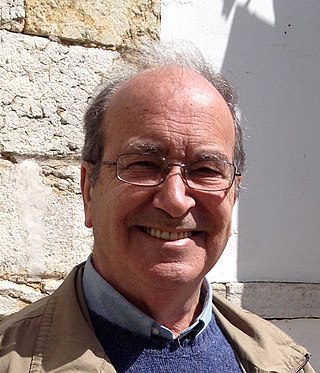
Juan Manuel Rodríguez López is a Spanish-born, naturalized Ecuadorian author and professor. He holds a licenciate/BA degree in philosophy and a doctorate in literature from Pontificia Universidad Católica del Ecuador (PUCE). He was a professor at Universidad Central del Ecuador and Universidad Católica, as well as a founding professor of Universidad San Francisco de Quito, where he was Dean of the College of Communication and Contemporary Arts.

Aminta Buenaño Rugel is an Ecuadorian writer and politician.

Instituto Nacional Mejía is a public secondary educational institution of Quito. It was founded on June 1, 1897 by Eloy Alfaro Delgado, then president of Ecuador.
Nelson Estupiñán Bass (1912–2002) was an Ecuadorian writer. He was born in Súa, a city in the predominantly Afro-Ecuadorian province of Esmeraldas in Ecuador. He was first homeschooled by his mother before traveling to the capital city of Quito where he graduated from Escuela Superior Juan Montalvo with a degree in public accounting in 1932. Bass identified with the Communist Party during this time and in 1934 had the opportunity to publish two of his poems in the socialist diary La Tierra.
Iván Oñate is an Ecuadorean poet and academic. Oñate was born in on March 17, 1948, in Ambato, Ecuador. He lives in Quito, Ecuador. He has been called “the most original poet of the new generation” by French critics Jean Franco and Jean-Marie Lemogodeuc They further remark that “one must pay attention to his disquieting visions, to his taste for life and vertigo, to his wild revelations mixing anguish and delirium.” He has published eight books of poetry and fiction, and his widely anthologized work has been translated into at least five languages.
Blanca Eugenia Viteri Segura was an Ecuadorian writer, anthologist, women's rights activist, and teacher. She has been described as "a grand dame of Ecuadorian literature."
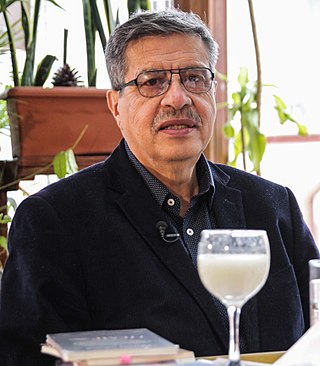
Abdón Ubidia (1944) is an Ecuadorian writer who is considered one of the most representative and relevant voices of modern Ecuadorian literature. He was the 2012 recipient of the Premio Eugenio Espejo in Literature, awarded to him by President Rafael Correa.

Filoteo Samaniego Salazar was an Ecuadorian novelist, poet, historian, translator, and diplomat. He became a member of the Ecuadorian Academy of Language in 1984, and was its secretary from 1996–2006. He was awarded Ecuador's most prestigious prize, the Premio Eugenio Espejo, in 2001. Samaniego's diplomatic career began in 1949 as the chief of staff of the Ministry of Foreign Affairs of Ecuador. He served as Ecuador's Ambassador to Austria, Germany, Romania and Egypt; and was a permanent representative of Ecuador to the United Nations Industrial Development Organization (ONUDI); and held many other academic, national, and international posts in his lifetime. He translated books from French to Spanish, including the Spanish translation of Chronique (1960) by the French Nobel laureate Saint-John Perse.

Rafael Díaz Ycaza was an Ecuadorian poet, novelist, short story writer, and columnist for the Ecuadorian newspaper El Universo.
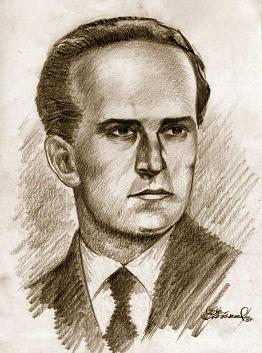
Humberto Fierro was an Ecuadorian poet who was part of a group known as the "Generación decapitada". The group is called "decapitada", or decapitated, because all its members committed suicide at a young age.

Carmen Acevedo Vega was an Ecuadorian poet, writer, and journalist.
Luz Argentina Chiriboga is an Afro-Ecuadorian writer who was one of the first writers to address the duality African and Hispanic cultures. In her poetry and novels, she writes about women in ways that challenge preconceived stereotypes. Her short story "El Cristo de la mirada baja" won first prize in 1986 in the International Literary Contest of the Liberator General San Martín held in Buenos Aires.
Cecilia Ansaldo Briones is an Ecuadorian professor, essayist, and literary critic.
Rodrigo Abelardo Pesántez Rodas was an Ecuadorian writer and poet.

María Auxiliadora Balladares Uquillas is an Ecuadorian writer and professor at Universidad San Francisco de Quito.
The Jorge Carrera Andrade Award is a literary award given by the Municipality of Quito, Ecuador to the best poetry book published during the year. It is awarded simultaneously with the Joaquín Gallegos Lara National Fiction Prize, on 1 December of each year. This happens in commemoration of the Day of Quito Interculturality, which takes place as part of the city's founding celebrations.